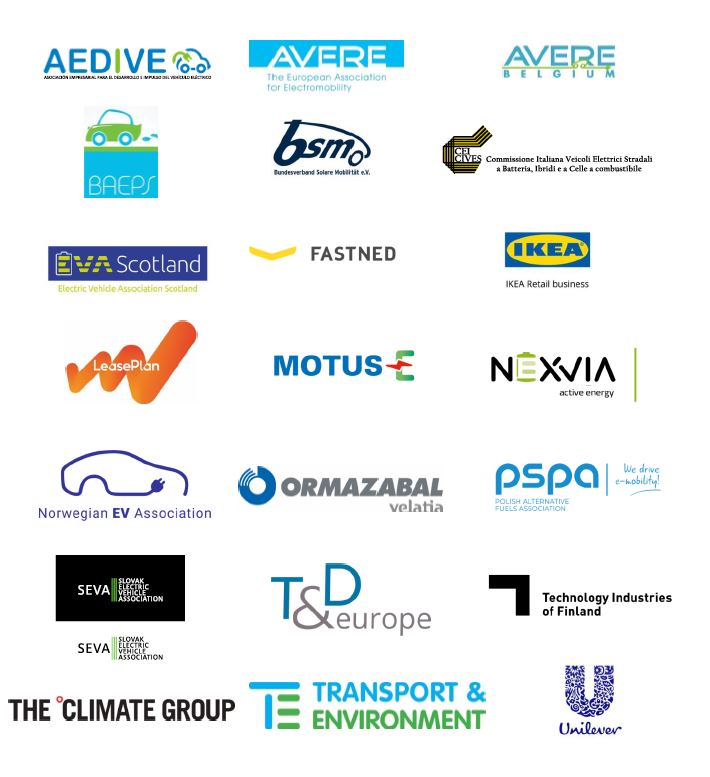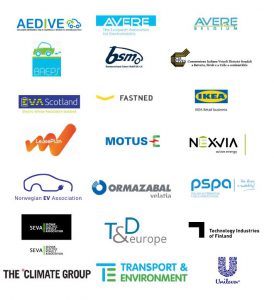
25 May 2020
To:
Commission President von der Leyen
Cc:
Vice-President Timmermans
Vice-President Dombrovskis
Commissioner Valean
Commissioner Breton
Charles Michel, President of the European Council
Subject: E-mobility at the Heart of the upcoming EU Recovery Plan
We welcome your commitment to ‘strengthen our economies by focusing on common priorities like the European Green Deal’ in response to the COVID-19 crisis. Similarly, we support that the European Parliament recently agreed in an overwhelming majority that the €2 trillion economic recovery and transformation plan should have the European Green Deal at its centre.
In this context, we are writing today to highlight how an economic recovery plan that promotes e-mobility will support public health and climate change objectives as well as boosting the economy. Following our previous letter dated 16 April 2020, we urge you to ensure that that the European e-mobility sector is put at the heart of any EU recovery plan for the transport sector.
Zero emission mobility, and electrified transport specifically, is the most effective way to meet short term and long-term climate and CO2 emission-based targets for Europe, while dramatically reducing toxic air pollutants.
We therefore call on you to ensure that the recovery plans prioritise public funding to electric vehicles needed to return to the unprecedented growth in EV sales that Europe has seen over the first quarter of 2020. Prior to lockdown, EV supply was just beginning to catch up with the vast pent up demand of private customers and corporate fleets (as demonstrated by The Climate Group’s EV100 initiative).
We are also concerned about the possibility of EU or national money being used to support all Euro 6d temp cars regardless of CO2 emissions, as this would include even large diesel or petrol SUVs. We ask the Commission to ensure, through its new recovery programmes and guidelines to member states, that no taxpayer money goes to subsidising legacy technologies run on fossil fuels.
At the same time, subsidising outdated and traditional fossil fuelled technologies (i.e. internal combustion engine vehicles) with public funding would go against the key objectives of the Green Deal and the clean mobility transformation in overall.
In fact, taking advantage of a potential EU-wide ‘purchasing facility’ for Clean Vehicles that prioritises zero emission (electric) vehicles and drive trains and boosting sales on segments where supply is still lagging (e.g. heavier duty vehicles) would be key in this regard.
Further relief actions such as revising the current EU VAT Directive to provide exemptions for zero emission vehicles will provide concrete and long-term certainty for investment in the sector.
The roll-out of charging infrastructure also has vast potential as a green stimulus measure. The crisis has put a brutal stop to both its deployment and use and will affect the sector’s financing capacities.
As such, we call on the Commission to drastically increase the target and funding available for the development of public charging points by 2025 previously set out in the original Green Deal Communication. Effectively using new and existing funding instruments to steer private and commercial investments into charge points, notably via InvestEU & CEF, would create jobs across the continent, in both urban and rural settings.
Providing the market with the right investment signals will help get the charging network ready for the mass volumes of EVs expected over the next five to ten years.
The coronavirus has impacted the world greatly and will have long-lasting consequences for the recovery of Europe in particular. But a revised Multiannual Financial Framework (MFF) combined with a transformational economic recovery plan, that has the green mobility transition at its heart, will ensure its businesses emerge from the crisis stronger and greener, ready for the climate challenge ahead of them.
Yours sincerely,


